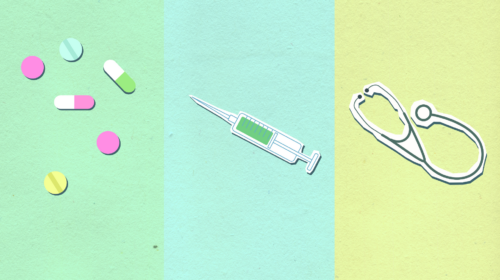The answer to the question of how to define “music” must be so elemental it almost defies explanation. How can you have a solid definition for music encompassing everything from Gregorian Chants to Jazz to Swedish Death Metal?
In its most basic form, music is composed of sounds. These sounds can have different forms, harmony, melody, rhythm, or emotion. Music evokes an experiential moment in hearing, playing, writing, and simply enjoying that can significantly impact your wellness.
The Healing Power Of Music
Music has been around since the dawn of time. Back when beating a sheepskin stretched over a hollow bowl with a stick was the edgy thing to do, music had a powerful effect on the people producing and listening to it. Chanting has even been associated with increased mindfulness and decreased mind wandering.[1]
Music has historically been a core expression of religious life. However as society becomes increasingly secularized, music is the closest thing to a spiritual experience some people can get. Don’t get us wrong–music isn’t inherently spiritual–but it does have a powerful, measurable effect on our brains. Two measurable ways music affects our brains are:
- There are neuron populations in our brain that are only activated by the sound of singing music.[2] Some neurons are only activated by speech, and others only by noise, while others are activated only by music.
- When you hear your favorite song, you might feel chills run up and down your spine. That’s not just psychological sleight of hand. That occurs because your brain releases dopamine both in response to and in anticipation of good music.[3]
What is Music Therapy?
A certified music therapist is a professional with a music therapy degree from an accredited school. There are over 100 colleges on the American Music Therapy Association’s (AMTA) website that offer a degree program in music therapy.[4]
Music therapy could include everything from improvisation, listening, songwriting, performance, and learning through music. It’s considered to fall within the purview of integrated medicine, and as such, only preliminary research on its efficacy has been done.
Even so, early research suggests music therapy could improve the well-being of patients suffering from pain, anxiety, dementia, depression, stress, and more.[5] The sample sizes of these studies were generally too small to draw statistically significant conclusions, so there is more work to do.
Here at Recovery Unplugged, music therapy is a core part of our program. We were the first treatment center to offer such a music-intense program as part of our rehabilitation. We combine music with pharmacological and cognitive behavioral help to ensure the best chance of long-term sobriety.
3 More Cool Facts about Music Therapy
It’s In The United States Code
The United States Code is the collection of all laws of the United States. It runs about 60,000 pages.
In Title 42 (The Public Health and Welfare) and Chapter 35 (Programs for Older Americans), music therapy is recognized for its restorative, preservative, and ameliorative qualities in the lives of older Americans.[6]
Since it’s in the US code and an integrated form of treatment widely accepted by health professionals, music therapy is a viable intervention that can restore, preserve, and improve the lives of those participating in the experience.
Endorsed By The Joint Commission on Accreditation of Rehabilitation Facilities (CARF)
CARF is a non-profit organization that has promoted the quality, value, and optimal outcomes of healthcare services since 1966.[7] It recognizes music therapists as properly licensed providers of good healthcare services if they work inside an accredited facility.
CARF has international respect for its high standards and culture of continuous improvement.
There Are No Side Effects
Music therapy is unique in that there are no side effects associated with the intervention if used for reducing psychological and behavioral disturbances. Your liver doesn’t need to filter music out of your body. Music isn’t a toxin and has no overdose potential, either. Rather, it works or it doesn’t.
Music therapy doesn’t work for everyone. Musicians have structural differences in their brains compared to non-musicians.[8] It’s possible people who really love music have the same differences, though this hasn’t yet been studied.
Whether those differences are attributable to the love of music or to the practice of music is yet to be determined. What is known is that music can be a powerful therapeutic tool for the right person.
Frequently Asked Questions about Music Therapy
What’s music therapy?
Music therapy is an intervention done by a licensed musical therapist using sounds to improve the well-being of a patient’s life. The therapy could include passively listening to music or actively making music. The music therapist will know what exercises would be most helpful to the participant.
Participants in music therapy could be suffering from pain, anxiety, autism spectrum disorder (ASD), cancer, chronic obstructive pulmonary disease (COPD), cognitive impairment/dementia, depression, fibromyalgia, multiple sclerosis, Parkinson’s disease, schizophrenia, sleep problems, stress, stroke, or tinnitus.
Why is music therapy important?
Music therapy is an important part of integrated medicine because it’s a non-intensive, non-chemical approach to healing and wellness.
There are no known side effects because music isn’t a toxin that must be flushed out of your body.
Listening to music you enjoy is a positive experience, and your brain responds by producing dopamine. Compared with the unnatural euphoria you experience after synthetic opioids bind to your receptors during substance abuse, the pleasure you feel from listening to music is a healthy response.
Is music therapy effective?
Yes. We’d certainly say so. We have a long list of former clients who could tell you our music therapy was extremely effective.
That said, music therapy isn’t a one-size-fits-all solution. Rather, music therapy is most powerful when combined with pharmacological and cognitive behavioral treatments. Beyond making music, our clients have a medication-assisted treatment plan and a trained psychiatrist who can help them build healthier thought patterns.
The Epicenter Of Music Therapy For Addiction and Dual Diagnosis Treatment
At Recovery Unplugged, we stand ready to assist anyone seeking professional music therapy in a community setting. The life you want to live is out there. We want to help you get there.
Sources:
- [1] Perry, G., Polito, V., Sankaran, N., & Thompson, W. F. (2022, October 27). How chanting relates to cognitive function, altered states and quality of life. Brain sciences. https://www.ncbi.nlm.nih.gov/pmc/articles/PMC9688188/
- [2] Norman-Haignere SV;Feather J;Boebinger D;Brunner P;Ritaccio A;McDermott JH;Schalk G;Kanwisher N; (n.d.). A neural population selective for song in human auditory cortex. CB. https://pubmed.ncbi.nlm.nih.gov/35196507/
- [3] Salimpoor, V. N., Benovoy, M., Longo, G., Cooperstock, J. R., & Zatorre, R. J. (n.d.). The rewarding aspects of music listening are related to degree of emotional arousal. PLOS ONE. https://journals.plos.org/plosone/article?id=10.1371%2Fjournal.pone.0007487
- [4] American Music Therapy Association. Organization Directory Search Results. (n.d.). https://netforum.avectra.com/eweb/DynamicPage.aspx?Site=amta2&WebCode=OrgResult&FromSearchControl=Yes
- [5] U.S. Department of Health and Human Services. (n.d.). Music and health: What you need to know. National Center for Complementary and Integrative Health. https://www.nccih.nih.gov/health/music-and-health-what-you-need-to-know
- [6] Title 42, Chapter 35. U.S.C. title 42 – the public health and welfare. (n.d.). https://www.govinfo.gov/content/pkg/USCODE-2017-title42/html/USCODE-2017-title42-chap35.htm
- [7] Quick facts about carf. Quick Facts. (n.d.). https://carf.org/about/
- [8] Gaser, C., & Schlaug, G. (2003, October 8). Brain structures differ between musicians and non-musicians. Journal of Neuroscience. https://www.jneurosci.org/content/23/27/9240

























